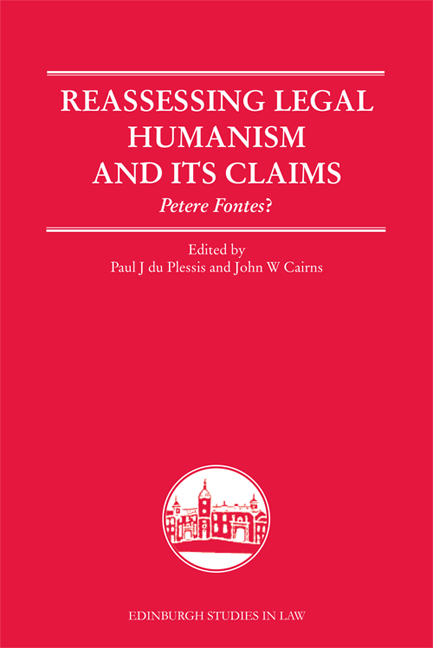Book contents
- Frontmatter
- Contents
- Preface
- A Note on Names and Book Titles
- List of Contributors
- List of Abbreviations
- Introduction
- Part I DEFINING LEGAL HUMANISM
- Part II A BREAK WITH THE PAST/CONTEMPORARY CRITIQUES
- Part III LEGAL HUMANISM: A PAN-EUROPEAN METHODOLOGY?
- Part IV LEGAL HUMANISM AND THE BOOK TRADE
- 12 The Thesauruses of Otto and Meerman as Publishing Enterprises: Legal Humanism in its Last Phase, 1725–1780
- 13 Humanist Books and Lawyers’ Libraries in Early Eighteenth- Century Scotland: Charles Areskine of Alva's Library
- Postscript
- Index
12 - The Thesauruses of Otto and Meerman as Publishing Enterprises: Legal Humanism in its Last Phase, 1725–1780
from Part IV - LEGAL HUMANISM AND THE BOOK TRADE
Published online by Cambridge University Press: 05 September 2016
- Frontmatter
- Contents
- Preface
- A Note on Names and Book Titles
- List of Contributors
- List of Abbreviations
- Introduction
- Part I DEFINING LEGAL HUMANISM
- Part II A BREAK WITH THE PAST/CONTEMPORARY CRITIQUES
- Part III LEGAL HUMANISM: A PAN-EUROPEAN METHODOLOGY?
- Part IV LEGAL HUMANISM AND THE BOOK TRADE
- 12 The Thesauruses of Otto and Meerman as Publishing Enterprises: Legal Humanism in its Last Phase, 1725–1780
- 13 Humanist Books and Lawyers’ Libraries in Early Eighteenth- Century Scotland: Charles Areskine of Alva's Library
- Postscript
- Index
Summary
A. INTRODUCTION
B. LEGAL HUMANISM
C. LAW IN THE BOOK MARKET BEFORE THE THIRTY YEARS WAR
D. THE LATIN TRADE AFTER 1650 AND THE ROLE OF THE NETHERLANDS
E. HISTORIA LITTERARIA, THE REPUBLIC OF LETTERS AND LEGAL HUMANIST AUTHORS
F. THE THESAURUS JURIS ROMANI (1725–1744)
G. THE NOVUS THESAURUS AND ITS SUPPLEMENT (1751–1780)
H. CONCLUDING REMARKS
INTRODUCTION
Dr Tydeman, who is still an ornament of the university of Leyden, thought it expedient [in 1802] to pronounce and publish an academical oration on the excessive study of the civil law. This is a species of excess which no person, interested in the prosperity of the British universities, need at present anticipate with any painful degree of anxiety; and if too much learning should seem to have made some of our lawyers mad, it must at least be admitted that a very small portion of their learning is drawn from the recondite sources of the Roman jurisprudence. Nothing is indeed more common than to hear them declare their decided opinion as to the utter inutility of such a study.
This satirical comment (in a review of one of the early contributions to the nineteenth-century German Historical School of Roman Law) was made almost half a century after the supplement to Gerard Meerman's Novi thesaurus Juris Civilis et Canonici (1751–1753; supplement 1780) appeared. It is aimed at English, not Scottish, jurists (the latter being expressly excluded from the accusation in a footnote); but even they had lost interest by this date in purchasing books on the historical study of Roman law, which Meerman's collection of humanist texts, and the earlier Thesaurus Juris Romani (1725– 1735) associated with the name of Everhard Otto, had vigorously promoted. So for the benefit of whom were these thesauruses produced? My aim here is to address this question by looking at the material facts of their publication and the broader intellectual context of their own time and of what preceded them. This chapter thus combines a study of legal humanism as a genre of legal writing with an examination of the facts surrounding its publication in the form of as multi-volume large-scale enterprises in a commercial, academic, political and ideological context (the United Provinces) that was particularly favourable to it.
- Type
- Chapter
- Information
- Reassessing Legal Humanism and its ClaimsPetere Fontes?, pp. 299 - 347Publisher: Edinburgh University PressPrint publication year: 2015

